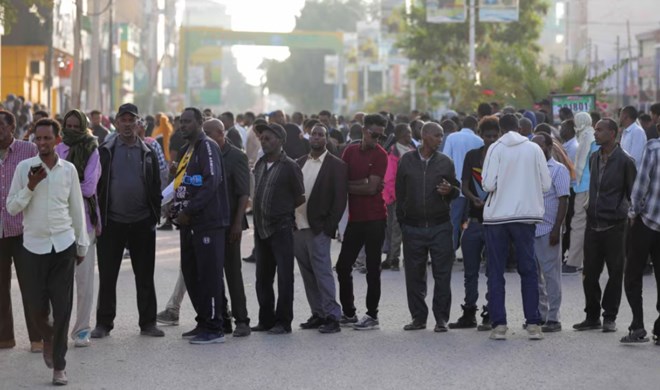
By Mohamed Olad Hassan
Thursday November 14, 2024

People queue to cast their votes during the 2024 Somaliland presidential election at a polling station in Hargeisa, Somaliland, Nov. 13, 2024.
Polls have closed across Somaliland after presidential elections, and it appears Wednesday's voting across the breakaway region has gone smoothly.
The Somaliland National Electoral Commission (NEC) said polls closed across the region at 6 p.m. local time. More than 1 million people were registered to vote across some 2,000 polling stations in Somalia's breakaway region.
advertisements
In the evening, vote counting was underway, according to the electoral agency."It will start from polling centers level, then passes to district, and the regional before we announce the result," said NEC Chairman Muse Hassan Yusuf. "We have successfully solved minor technical issues reported in some polling stations," he said.
He said the NEC would announce the result of the election by November 21.
General Mohamed Adan Saqadhi, head of Somaliland Police Force, said throughout Somaliland the election was peaceful.
"Thanks to Allah, the election took place democratically and peacefully. No incident was reported," said Saqadhi.
Candidates promise to grow economy
Three candidates, including incumbent President Muse Bihi Abdi, were on the ballot in Wednesday's poll. In interviews with VOA Somali, each of the three candidates promised to strengthen democracy, boost economic growth, and gain the international recognition Somaliland has sought for 33 years.
Abdi, of the ruling Peace, Unity and Development Party, also known simply as Kulmiye, was seeking a second term. He ran against Abdirahman Mohamed Abdullahi, known as "Irro," of the Waddani party and Faisal Ali Warabe of the Justice and Development Party, or UCID.
This is the fourth presidential election since the region on the northwestern tip of Somalia broke away from the rest of the country, following the collapse of the Siad Barre regime in 1991.
The territory declared independence that year but has never achieved international recognition.
Despite that, Somaliland has a functioning government and institutions, a political system that has allowed democratic transfers of power between rival parties, its own currency, passport and armed forces.
Voters cast ballots amid tension
Wednesday's vote comes at a time when tensions remain high between Somalia and Ethiopia over a controversial memorandum of understanding that Ethiopia signed with Somaliland.
The deal would grant Ethiopia a 50-year lease of access to 20 kilometers of the Gulf of Aden coastline in exchange for the potential recognition of Somaliland's independence, which Somalia views as a violation of its sovereignty and territorial integrity.
The deal, signed on January 1 in Addis Ababa by Abdi and Ethiopia Prime Minister Abiy Ahmed, sparked anger in Mogadishu, which considers Somaliland part of its national territory.
In April, Somalia expelled Ethiopian Ambassador Muktar Mohamed Ware, alleging "internal interference" by Ethiopia. Somalia also ordered the closure of Ethiopia's consulates in Somaliland and Puntland, although both consulates remained open.
Last month, Somalia expelled Mogadishu-based Ethiopian diplomat Ali Mohamed Adan, who was a counselor at Ethiopia's embassy in Mogadishu.
In July and August, two rounds of talks between Ethiopia and Somalia, mediated by Turkey, failed to solve the dispute, with Somalia demanding Ethiopia withdraw from the deal and Ethiopia insisting that it does not infringe on Somalia's sovereignty.
On Saturday, Somali Defense Minister Abdulkadir Mohamed Nur repeated the Somali government position against Ethiopian troop involvement in a new African Union peacekeeping mission in Somalia due to start in January.
"I can say that Ethiopia is the only government we know of so far that will not participate in the new AU mission because it has violated our sovereignty and national unity," Nur said Saturday in a government-run television interview.